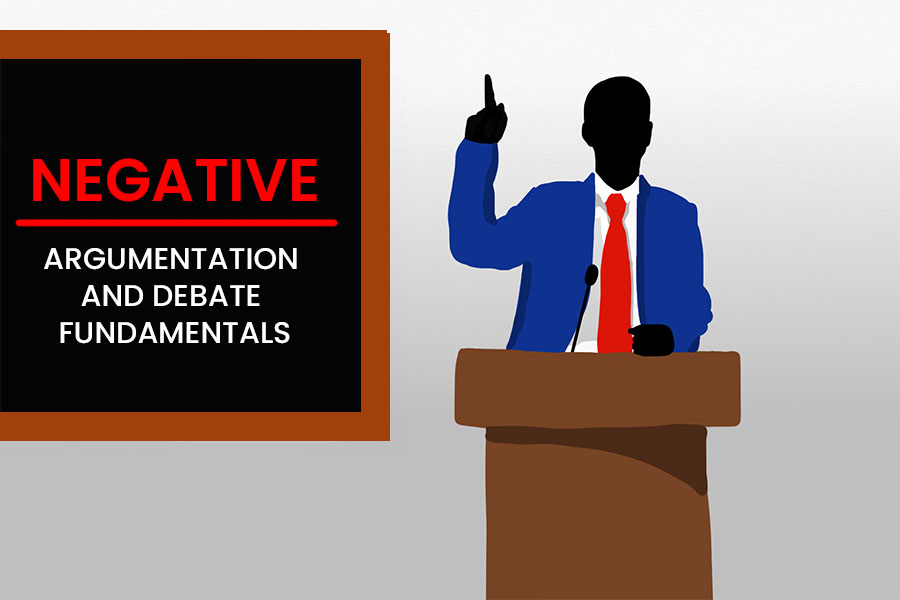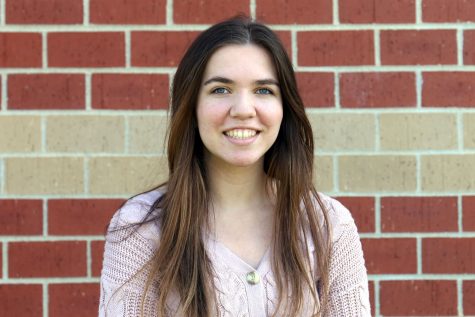Non-competitive debate class threatens program’s future
The school’s decision to offer Argumentation & Debate Fundamentals next year will be detrimental to the debate program’s competitiveness
The district’s implementation of the class Argumentation and Debate Fundamentals has the potential to harm the school’s competitive debate program.
January 31, 2020
Showcased in the debate team’s unprecedented success at the 6A 2-Speaker state tournament, the program has experienced a trend of exponential growth and success in the past few years. The varsity team’s dedication to personal improvement and building the school’s reputation on the national circuit has been incredibly impressive, and the team’s performance this season is a testament to their hard work.
However, the addition of a new communications class, Argumentation & Debate Fundamentals, threatens to bring this success to a grinding halt and could collapse the young debate program altogether.
This new course, listed in the USD 232 Course Guide for the 2020-2021 school year, will be a non-competitive version of the current debate class without the tournament and practice requirements – in other words, a class perfectly positioned to drain the school’s competitive debate program of possible participants and, subsequently, competitiveness.
Underfunded – working with a mere $200 budget to cover everything except in-state transportation fees and limited entry fees – and incapable of attracting students the way more recognisable activities or established debate programs can, our young program is incredibly fragile to begin with; adding a class that attracts from the same pool of participants will be detrimental.
Due to the new course, there will now be zero incentive for students to choose the competitive debate class over the option that requires less work (excluding the few who enroll knowing they want to debate competitively). These students won’t get to experience tournament competition, which is a necessary factor in students deciding whether or not they want to pursue debate. Therefore, no longer needing their communications credit, few will advance to competitive Debate.
Losing these students to the introductory debate class will quickly deteriorate the debate program’s ability to be competitive, hence why former debate coach Annie Goodson declined to teach the class last year when the district first tried offering the course at Mill Valley. According to head debate coach Sohail Jouya, programs that offer non-competitive debate courses are “not competitively viable and are usually quite lacking in success.”
This is supported by the fact that out of the 26 schools that competed in this year’s 6A 2-Speaker state tournament, only the Olathe school district and Junction City High School offer non-competitive debate courses. More importantly, none of these schools won an elimination round. (Technically Washburn Rural and the Blue Valley district offer non-competitive courses as well, but these classes are designed for competitive students to begin preparing for the following season).
Jouya notes that the team’s most fervent debaters may never have found their passion for the activity in the first place if Argumentation & Debate Fundamentals had existed when they initially joined the program.
“Even the current debaters we have now, especially our better debaters and our extremely diligent and dedicated debaters, have voiced that if they’d had that option, they would have picked the non-competitive course because there’s less work to do,” Jouya said.
This leaves the team with a mere trickle of new debaters and no way to sustain the program, let alone maintain enough talent to continue the team’s current level of success.
The varsity debate team is as equally adamant that this new course could be the downfall of the program and has implored the district to remove the course immediately. Varsity debater Adam White sent an explanatory letter to associate principal Jennifer Smith outlining exactly why this class will bring about the program’s demise; the letter was read and later dismissed, and no change was made. You can read White’s full letter here.
As a follow-up to Smith’s rejection of White’s letter, Jouya spoke directly with Director of Curriculum and Instruction Dr. Joe Kelly about removing the course; again, the district’s response was a firm no.
While Joe Kelly explained to me, via email, that the purpose of implementing this class is to teach argumentation and research skills, directly quoting the course guide’s class description, the district’s lack of empathy throughout the process made me wonder why they so adamantly believe this course is worth offering. There are neither students nor parents advocating for it at Mill Valley… just a debate program standing vehemently against it.
Reiterating the district’s response to Jouya’s original request to remove the course, Joe Kelly commented that the district believes the class could strengthen the program.
“Done correctly, we can see how a course like Argumentation & Debate [Fundamentals] could be used to grow numbers in competitive debate,” Joe Kelly said.
This view is fundamentally flawed for multiple reasons.
For starters, this mindset isn’t compatible with the reality of high school debate. We have to acknowledge that sustaining a debate team can’t be compared to how mainstream sports and clubs recruit. For instance, prior to competing in tournaments, students can’t truly understand what high school policy debate actually entails, let alone whether or not they would want to pursue it. The necessary exposure to competition that exists in the current course is what gives debate its value and allows students to grow intellectually.
Furthermore, if Joe Kelly is correct that some students may transition to Debate after taking Argumentation & Debate Fundamentals, then this still comes at a price. Students who take this course before competitive Debate would lose an entire year of competition, making it impossible to generate a wealthy pool of experienced, four-year debaters.
Jouya predicts that few students will advance to Debate from Argumentation & Debate Fundamentals and notes that even if they did, the transition would hurt both the program and the individual student’s competitiveness if they end up pursuing the activity.
“That means they’ve lost a whole year of development,” Jouya said. “That’s like telling a football player, ‘Hey, for your first year, just watch film and then next year, you can go ahead and pad up and put on a helmet and really play.’ That not only limits their ability but puts their ceiling pretty low, for not only competitive success but opportunities for scholarships and things like that.”
Still, Joe Kelly argues that students can benefit from the non-competitive class alone.
“We realize that not all students have the same level of interest and commitment to all activities. There are students who may have an interest in debate but are not committed to the time competitive debate takes…” Mr. Kelly said. “At the very least, it could give students access to acquiring the important skills a course like this would offer.”
This mindset demonstrates a shallow understanding of both the class and the activity.
It must first be noted that the class doesn’t have to be a significant time commitment for every student. When comparing competitive debate to the average high school sport – which generally has required practices every weekday and games more than once a week – it is clearly unfair to claim that Debate’s requirements are even close to equalling that of other extracurriculars. Novice debaters are only required to go to five tournaments and 12 work nights throughout the entire semester; even students who participate in fall and winter sports are capable of fulfilling the minimum requirements. For those who take the class and realize competition isn’t for them, they can opt to do the bare minimum while still greatly improving their public speaking skills by attending a few tournaments.
Furthermore, the sole reason why Debate – as opposed to other speech classes – builds significant speaking and research skills is because there is this incentive beyond a good grade for students to do so: in competitive debate, a year-long debate topic allows students to practice in-depth research on countless areas within the broader topic; students don’t want to lose, so they become familiar with hundreds of arguments; students are driven to appear more prepared and more intelligent than the other team, so they learn to think on their toes and speak coherently and concisely; tournaments also build mental stamina, because spending an evening debating does wonders for one’s ability to maintain focus.
Take away this competitive drive, and students will get nothing out of the course that isn’t already offered in Communications class, the curriculum for which already includes an argumentative speech that requires research.
So why does the school want to offer this class so badly? After speaking with Joe Kelly, a little digging led me to De Soto’s head debate coach, Inga Kelly, who was the original advocate for the course and began teaching the course this fall. Inga Kelly’s justification for the class mirrored the district’s with just a few additional points. She described via email a possible downside of having too many students in competitive debate.
“Having an abundance of students who are not fully committed to debate could result in a drain on time and resources available to those who actually like debate and want to excel competitively,” Inga said.
This argument holds no truth in regards to Mill Valley, as our program is young and consistently hurting for more participants. Even for those students who don’t end up wanting to pursue the activity, Jouya sees their participation as something worth funding.
“A lot of students don’t know that they like the competitive thing until they do the competitive thing,” Jouya said. “And secondarily, I don’t really consider it to be a waste of resources for students to go out and learn, and to practice their skill, even if it’s something that at first, maybe they do or do not enjoy. Even the discovery of finding out what things you do like, and more importantly, just even trying it, I don’t ever think is a waste.”
Even Inga Kelly admits that the course resulted in an immediate reduction of competitive debate students this fall.
“Since the class was new this fall, it did decrease our numbers for Debate I,” Kelly said. While she believes competitive debate will eventually grow stronger from this addition, this certainly has yet to be seen in any debate program across the state.
Clearly, the downfalls that accompany Argumentation & Debate Fundamentals significantly outweigh any possible benefits. Don’t let an unnecessary class cripple the debate team’s painstaking efforts toward improvement and success. I urge everyone to voice their support for the program and fight for this class to be removed.












Sarah Johnston • Jan 31, 2020 at 1:05 pm
This article does a fantastic job highlighting why this new class would be so detrimental to the program. Our team is already quite young, and still in the developmental stages. To throw a curve-ball in this early would hinder further success and ultimately cause more damage. Debate without competitions is like football without games – it just doesn’t work out in the long run. If the administration takes football seriously, they should treat debate the same. We encourage you to vote “Yes” to raise awareness and plead the administration to not implement this class.
Thomas Babcock • Jan 31, 2020 at 9:47 am
As the only 4 year varsity member on the team this year I can say with 100% certainty that this article is amazingly insightful and 100% correct. This new class is a death sentence to the team. Please speak up and implore your teachers and the administration to ensure that this class DOES NOT get placed in the 20-21 school year.
Noah Reed • Jan 31, 2020 at 9:39 am
Very well said, everyone PLEASE vote “Yes” in the poll if you’re convinced by the story!